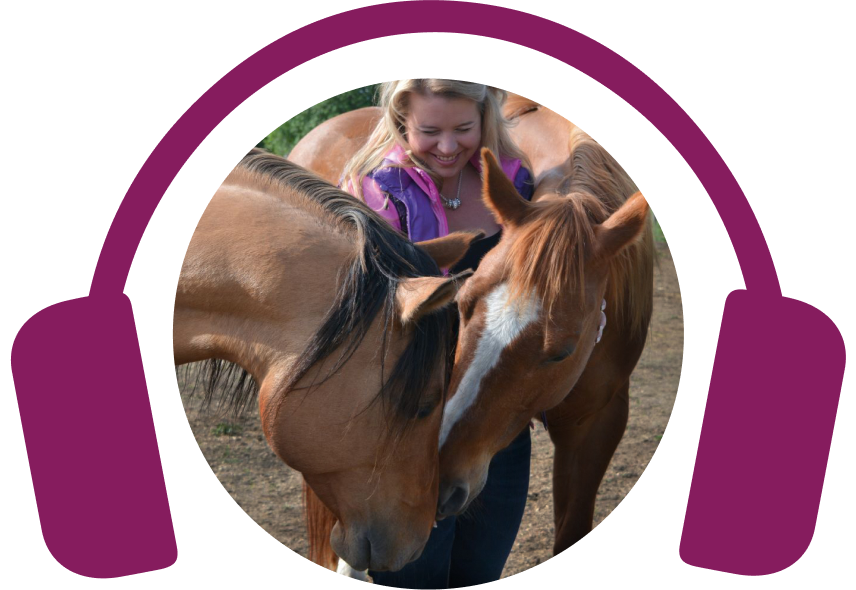Elisha’s Podcast
ELISHA’S PODCAST

Ready to get your horses on the path to better health?
This podcast was created to do just that.
Tune in to get new insights, perspectives, horse health tips, and real-life horse healing stories.
Take what you learn and apply it to your horse TODAY.

One Conversation at a time
From learning what to feed your horse and how to use nutrition effectively, to practicing prevention and approaching specific health challenges naturally, to just bringing your horse more joy and better health…
I’ve got you covered!

Check out my recent episodes
Today, we are bringing you a rerun of Episode 16. This episode explores alfalfa, a highly nutritious feed that often leaves horse owners uncertain due to the many conflicting opinions on its proper use and ideal feeding amounts. Join us as we tackle the ins and outs of incorporating alfalfa into your horse's diet and debunk some of the common misconceptions surrounding it. Diverse Uses of Alfalfa Horse owners can use alfalfa for many different purposes. Some use it to provide extra calories during the winter, while others use it to help their horses gain weight. Some owners like to use alfalfa as a source of energy to enhance a horse’s performance and contribute to muscle building. Others claim that using alfalfa prevents issues like chronic diarrhea and fecal water syndrome in their horses. The Equine Microbiome Horses get their energy from fermenting fiber. Alfalfa may help with issues like chronic diarrhea or fecal water syndrome because it impacts the tiny organisms in the microbial populations of the hindgut. I spoke about the equine microbiome in Episode 10, so you can go back and listen to that episode to refresh your memory if you need to. Toxicity Issues Diets high in alfalfa can lead to potential feed toxicity issues, like leaky gut, due to the shift in microbial populations and increased body acidity caused by those diets. You need to know the horse's history and monitor the amount and duration of alfalfa feeding to avoid complications. Understanding Alfalfa as a Forage Contrary to common belief, alfalfa is a legume and is not part of the grass family, a difference that impacts its macronutrient composition. With a protein content ranging from 14 percent to 25 percent, alfalfa can be a valuable supplement for horses. It does contain a high lignin content, making it less digestible and less efficient than grass as an energy source. Alfalfa as a Protein Supplement Despite its limitations as an energy source, alfalfa shines as a protein supplement for horses. Horses with protein deficiencies or higher protein requirements, such as young horses, rescue horses, or seniors, can benefit from alfalfa supplementation. For older horses with slower metabolic rates, alfalfa can be particularly helpful in meeting their nutritional needs. In Conclusion While alfalfa may have some limitations and not necessarily work as a replacement for grass, it can still be a valuable supplement for horses as it contains essential nutrients, like protein in particular. By learning about the role of alfalfa and understanding its benefits, horse owners can make informed decisions on incorporating alfalfa effectively into the diets of their equine companions. Links and resources: Connect with Elisha Edwards on her website Join my email list to be notified about new podcast releases and upcoming webinars. Free Webinar Masterclass: Four Steps to Solving Equine Metabolic Syndrome Naturally Register for Resolving Equine Metabolic Syndrome Naturally, now. The adrenal glands play a crucial role in keeping horses healthy and resilient. My recent hands-on experience with horse dissections highlighted the importance of the adrenal glands for metabolism, hormone regulation, and stress response in horses. When horse owners learn how the adrenal glands work and how chronic stress affects them, they can become far more effective in supporting the health and well-being of their horses. The Role of the Adrenal Glands The adrenal glands produce cortisol, ACTH, and DHEA, which regulate energy, influence immune function, and affect the overall hormone balance in horses. Horses are prey animals, so they tend to be on high alert. That means their adrenal glands are often working overtime. When a horse is under constant stress from its environment, emotions, or physical strain, it can lead to adrenal fatigue, affecting everything from metabolism to immune function. Hormonal Imbalances and Their Effects Horses with metabolic issues like PPID or insulin resistance often have adrenal dysfunction. High cortisol levels can lead to tissue breakdown, slow healing, and weaken the immune system. The adrenals also play a role in sex hormone production, as DHEA influences testosterone and estrogen levels. So adrenal health can affect everything, including the reproductive cycle of mares and the hormone balance of geldings. Understanding those connections helps horse owners make better health decisions. The Impact of Chronic Inflammation and Stress Many horses deal with low-grade inflammation from environmental toxins, poor diet, or chronic illness. With those issues, the adrenal glands keep pumping out cortisol, which, over time, can wear them out. When adrenal function drops, the pituitary gland produces more ACTH, which can contribute to metabolic disorders. To manage that, owners must reduce external stressors, like inadequate stable conditions and poor handling techniques, and internal stressors, such as diet and gut health. Nutritional and Holistic Support Supporting adrenal health in horses requires a combination of proper nutrition, stress reduction, and careful hormone management. Horses naturally produce vitamin C, but in times of stress, they may require supplementation. Other vital nutrients include minerals that help regulate adrenal function. Maintaining a balanced diet that promotes gut health can also reduce overall stress on the body, and providing horses with an environment that meets their instinctual needs for freedom, forage, and friendship is vital for reducing chronic stress. Recognizing the Signs and Taking Action As research into equine adrenal health progresses, more vets and equine professionals recognize the signs of adrenal insufficiency. Symptoms like persistent fatigue, poor coat quality, muscle wasting, and metabolic imbalances can indicate underlying adrenal stress. By taking a proactive approach to adrenal support through dietary improvements, environmental enrichment, and holistic care, owners can help prevent long-term health complications in their horses. Links and resources: Connect with Elisha Edwards on her website Join my email list to be notified about new podcast releases and upcoming webinars. Free Webinar Masterclass: Four Steps to Solving Equine Metabolic Syndrome Naturally Register for Resolving Equine Metabolic Syndrome Naturally, now. Dedicated owners want the best for their equine companions. However, understanding what is going on with a horse’s health can sometimes be puzzling. Creating a health profile for horses is a simple yet powerful tool to give owners deeper insight into the overall well-being of their horses. Writing their health history down on paper helps owners understand what is and is not working and how their diet, stress, or past issues might influence their condition, making it easier to fine-tune their care. Having a clear record also allows owners to spot trends over time, helping them make more informed health decisions for their horses. What to Include in a Health Profile Begin by documenting all major health events, including illnesses, injuries, emotional upheavals, and changes in diet or living conditions. Dates and ages matter as events like a severe infection or a drastic diet shift could have long-lasting effects. It is also important to note any lifestyle changes, like moving to a new barn or losing a companion, as those could impact the horse's physical and emotional health. Identifying Root Causes of Health Issues When assessing health problems, I focus on three primary causes: toxicity, stress, and nutrient deficiencies. By categorizing past and current health issues within those areas, you can start to see trends. Tracking those factors helps you understand the root cause of ongoing health struggles and make targeted changes. Creating a Healing Strategy After compiling their health history, the next step is identifying key themes. I use a healing layer approach, categorizing issues by organ systems like digestive health, immune function, hormonal balance, etc. If, for example, a horse repeatedly struggles with skin conditions, we may need to focus on immune support and detoxification rather than just treating surface symptoms. This method helps ensure that interventions are specific, effective, and sustainable. Fine-Tuning Diet and Supplements With a well-documented health profile, you can make smarter choices about nutrition and supplementation. Instead of throwing every possible remedy at the problem, you can tailor your approach based on your horse's needs. Some horses thrive with diet adjustments alone, while others require targeted supplementation or homeopathic remedies. The goal is to avoid wasting time, money, and energy on unnecessary treatments and focus instead on what will benefit your horse. Links and resources: Connect with Elisha Edwards on her website Join my email list to be notified about new podcast releases and upcoming webinars.
Meet your host
Hi there, I’m Elisha Edwards

Meet your host
Hi there, I’m Elisha Edwards
I have helped guide thousands of horses back to good health over the years from a variety of different health challenges. And through my courses, webinars, and speaking engagements I educate and empower horse owner’s from around the world to take charge of their horse’s health using the holistic model of health care.
So I know first-hand how difficult and overwhelming it can be to navigate all the different opinions and conflicting information that you come across especially when your horse is faced with a health problem. In many cases, the journey is just as hard on the owners as it is on the horses.
I started Healing Horses with Elisha to guide you, support you, and encourage you through the process of prevention and recovery so you feel good about the decisions you’re making for them.
Here’s what I believe
I have seen countless horses with seemingly impossible health conditions that have been resolved so easily with the right combination of diet, nutrition, and natural remedies. In many cases, it is not the health conditions that prevents the horse from recovering, it is the lack of education, resources, and options that are available.
If the insight and information you gain from this podcast gives you some newfound hope or inspires you to take
a new approach then it has served it’s purpose.
Thank you for giving me the opportunity to help you improve your horse’s health.
Keep listening and learning. Your horse is worth it.
Listen Now
Tune in wherever you listen to your podcasts and follow me so you never miss an episode. I release a new one every Tuesday!

Leave a Review
Reviews help me reach more horses and also help me deliver more relevant content to you!

What my Listeners are saying
“Every time I think there is no way to top what you do – you elevate us to yet another level. I wish I had a fraction of your communication skills. You’re amazing and I am so grateful to be apart of the magic you are creating for horses and their humans.”
Tracey
“Your podcasts are fantastic! I get so excited to listen to the next one. I have 6 geriatric horses and your podcast has really opened my mind to new possibilities in their health and given me the strength to help them through hiccups in their well-being the past few months. I have a nursing education and you explain pathology better than my university professors.”
Sharon
“I can’t thank you enough for the Mindset Tips podcast. I really needed this reminder. It was just what I needed to hear to today.”



